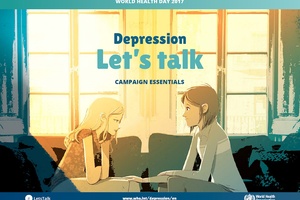World Health Day 2017: Let’s talk about depression and TB
The prevalence of mental disorders among people with TB is estimated to be between 40-70%.
Geneva ¦ 07 April 2017 - Depression is today the leading cause of ill health and disability worldwide, with more than 300 million people affected - an increase of more than 18% between 2005 and 2015. These new alarming estimates were released by the World Health Organization (WHO) in the lead-up to World Health Day on 7 April, dedicated to the theme “Depression: Let’s talk”. The year-long campaign promotes the goal that more people with depression both seek and get help.
The prevalence of mental disorders, including depression and anxiety disorders, among people with TB is estimated to be between 40% and 70%. There are several factors at play. Patients with mental disorders are at an increased risk exposure of TB infection with higher rates of homelessness, and residence in shelters and group homes. Patients with mental disorders also carry other risk factors for TB, including smoking, poor nutrition and co-morbidities such as diabetes and HIV infection. In addition, people living with TB and mental disorders are less likely to seek health care and may be less able to adhere to treatment, with consequent adverse treatment outcomes including morbidity, mortality, drug resistance and ongoing disease transmission.
“Depression has been an invisible burden for people with TB. The risk of people with mental disorders being prone to developing TB, or the mental well-being of TB patients during their treatment has often been overlooked”, said Dr Mario Raviglione, Director of the WHO Global TB Programme. “We need to urgently address the mental and physical aspects of TB simultaneously if we want to improve well-being as well as treatment outcomes, ensuring no one is left behind in the fight to end TB”.
Adverse impact of TB treatment on mental health
Several anti-TB medications, such as cycloserine, may precipitate more severe forms of mental disorders—including major depression, anxiety, or psychosis. There is also evidence of increased risk of suicide behavior among people living with TB, including among women, those who are being retreated for TB, misusing alcohol, with previous psychological distress or post-traumatic stress disorders.
“We need to develop and implement guidelines to screen and treat depression among persons being treated for TB, and work closely with patients to improve their illness perceptions”, said Dr Shekhar Saxena, Director of the Department of Mental Health and Substance Abuse at WHO. “Both national TB programmes and programmes addressing mental health issues in countries need to collaborate closely to make this a reality.”
Synergistic and joint actions against TB and noncommunicable diseases including mental health, will be one of the themes addressed at the upcoming WHO Global Ministerial Conference: “Ending Tuberculosis in the Sustainable Development Era: A Multisectoral Response” in Moscow, 16-17 November.


